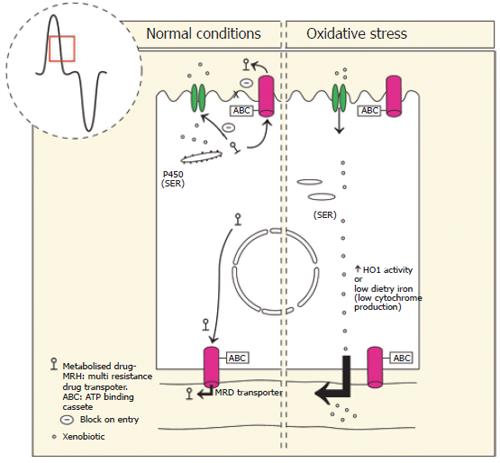Copyright
©2006 Baishideng Publishing Group Co.
World J Gastroenterol. Jul 21, 2006; 12(27): 4281-4295
Published online Jul 21, 2006. doi: 10.3748/wjg.v12.i27.4281
Published online Jul 21, 2006. doi: 10.3748/wjg.v12.i27.4281
Figure 3 Left: Xenobiotics in the diet enter the enterocyte via facilitated diffusion or a specific transport process.
Appropriate P450 expression on smooth endoplasmic reticulum (SER) enables first pass metabolism including phase I, and phase II metabolizing enzymes. Phase III multi drug resistance transporters (MDR) transport the conjugated-xenobiotic compound to the lumen or blood stream where increased hydrophilicity impairs re-entry into the enterocyte and leads to its elimination from the body directly. De novo synthesis of P450 occurs in the enterocytes and is dependent on appropriate levels of dietary iron. Right: In the presence of oxidative stress caused by high dietary intake of metals or compounds that induce heme oxygenase 1 (HO-1), heme containing P450 are broken down leading to increased entry of xenobiotics to the body. Dietary iron deficiency leads to reduced P450 activity and reduced detoxification capabilities.
- Citation: Oates PS, West AR. Heme in intestinal epithelial cell turnover, differentiation, detoxification, inflammation, carcinogenesis, absorption and motility. World J Gastroenterol 2006; 12(27): 4281-4295
- URL: https://www.wjgnet.com/1007-9327/full/v12/i27/4281.htm
- DOI: https://dx.doi.org/10.3748/wjg.v12.i27.4281









